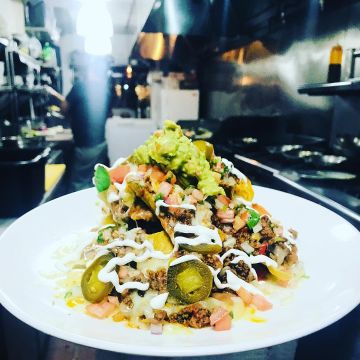Is Mexican Food Healthy? Unloading the Nutritional Perks of Conventional Ingredients
The question of whether Mexican food is healthy invites an exploration of its typical components. Beans and corn act as foundational staples, abundant in healthy protein and fiber. Avocados provide helpful fats, while numerous natural herbs and seasonings include taste and wellness benefits - New York Times rated. Together, these elements produce a tapestry of nutrition. Nevertheless, the healthiness of Mexican food frequently depends on preparation methods and section sizes. What function do these aspects play in determining its total nutritional worth?
The Power of Beans: Healthy Protein and Fiber-Rich Staples
Although often ignored, beans act as a cornerstone of Mexican cuisine, supplying a wealth of nutritional benefits. Rich in protein, they are an excellent plant-based choice for those looking for to fulfill their dietary protein needs. This high protein content sustains muscle mass repair and growth, making beans important for both vegetarians and meat-eaters alike. Furthermore, beans are an extraordinary resource of dietary fiber, which aids in digestion and promotes a sensation of volume, possibly assisting with weight administration.
The variety of beans used in Mexican recipes, such as black beans, pinto beans, and kidney beans, contributes to a varied flavor account and can boost meals nutritionally. Beans are reduced in fat and consist of essential vitamins and minerals, including magnesium, iron, and folate. Together, these attributes make beans a vital component, providing both nutrients and nutrition in conventional Mexican price.

Corn: a Versatile Grain With Nutritional Perks
Corn stands out as a flexible grain essential to Mexican food, celebrated not just for its culinary applications however also for its excellent nutritional account. As a key ingredient in meals like tortillas, tamales, and pozole, corn gives important nutrients that add to a well balanced diet plan. Rich in carbohydrates, it functions as a substantial power source, while additionally being reduced in fat, making it a beneficial alternative for numerous dietary requirements.
Moreover, corn is a good source of dietary fiber, which helps in digestion and advertises satiation. It consists of substantial quantities of vitamins such as B-complex vitamins, which are important for energy metabolic rate. The visibility of anti-oxidants, specifically carotenoids, adds to total wellness by decreasing oxidative stress. In addition, corn is gluten-free, accommodating those with gluten level of sensitivities. On the whole, the dietary advantages of corn highlight its value in standard Mexican food and its duty in a healthy and balanced diet plan.
Avocados: Healthy Fats and Nutrients in Every Bite
Avocados play a significant function in Mexican food, matching meals with their luscious structure and rich taste. Beyond their culinary charm, avocados are celebrated for their impressive nutritional profile. They are an abundant resource of healthy monounsaturated fats, which can assist reduced poor cholesterol degrees and support heart health. Furthermore, avocados are loaded with crucial nutrients, including potassium, vitamin E, and B vitamins, contributing to total wellness.
The high fiber material in avocados aids food digestion and promotes satiation, making them a beneficial addition to any kind of dish. Their one-of-a-kind nutrient make-up can also support skin health and wellness and offer anti-inflammatory benefits. Incorporating avocados right into typical Mexican meals or appreciating them as a standalone snack can improve both taste and nutrition, demonstrating why they are a cherished staple in Mexican cuisine. In general, avocados provide a tasty way to enjoy healthy and balanced fats and crucial nutrients in every bite.

Natural Herbs and flavors: Flavorful Wellness Boosters
While delighting in the rich tastes of Mexican food, one village inn can not overlook the crucial duty that spices and natural herbs play in improving both preference and health and wellness. Components such as chili, cilantro, and oregano Go Here peppers not only add to the vibrant flavor profile but additionally provide significant wellness advantages. Cilantro is recognized for its cleansing properties, helping to eliminate hefty metals from the body, while oregano is loaded with anti-oxidants and has anti-inflammatory results.
Chili peppers, a staple in lots of Mexican meals, consist of capsaicin, which has been connected to improved metabolism and pain relief. In addition, seasonings like cumin and coriander support digestion and may assist in blood sugar policy. Integrating these tasty health and wellness boosters into meals not only boosts the cooking experience yet additionally promotes general health, making Mexican food not simply delicious, however also nutritionally useful.
Conventional Food Preparation Techniques: Enhancing Nutrition and Flavor
Traditional cooking approaches in Mexican food play an important function in boosting both nutrition and flavor, as they frequently focus on classic strategies and fresh components. Strategies such as nixtamalization, where corn is saturated and cooked in an alkaline remedy, not only improve the nutrient profile of tortillas however also boost their digestibility - freshly made guacamole. Furthermore, the usage of slow-moving cooking approaches, like cooking or braising, allows flavors to meld perfectly while preserving the honesty of the ingredients

Regularly Asked Inquiries
Are Mexican Food Portions Normally Larger Than Other Cuisines?
Mexican food sections are often bigger than those of numerous various other cuisines. This characteristic mirrors conventional eating practices, stressing communal sharing and hearty meals, which can cause a more substantial serving dimension on the whole.
Just how Does the Preparation Technique Affect Healthfulness of Mexican Food?
Preparation visit homepage approaches considerably influence the healthiness of Mexican food. Strategies such as grilling or steaming protect nutrients, while frying can enhance undesirable fat web content. Selections of ingredients and cooking styles eventually establish total dietary value.
Can Mexican Food Be Customized for Certain Dietary Limitations?
Mexican food can indeed be customized for specific dietary constraints. Substitutions, such as utilizing corn tortillas for gluten-free diet plans or incorporating even more veggies, enable individuals to delight in traditional flavors while fitting various nutritional demands.
What Prevail False Impressions Concerning Mexican Food and Health?
Typical false impressions concerning Mexican food include the idea that it is inherently unhealthy, excessively zesty, and entirely concentrated on fats. In truth, traditional meals frequently include healthy ingredients and can be customized to numerous dietary requirements.
Are There Healthier Choices at Mexican Restaurants?
Healthier options at Mexican restaurants usually consist of grilled meats, beans, and fresh veggies. Picking recipes that stress entire active ingredients and avoiding hefty sauces can lead to an extra nourishing eating experience, advertising overall wellness.
The selection of beans made use of in Mexican recipes, such as black beans, pinto beans, and kidney beans, adds to a diverse taste account and can boost meals nutritionally. Avocados play a significant duty in Mexican food, enhancing recipes with their luscious texture and abundant flavor. Including avocados right into traditional Mexican recipes or enjoying them as a standalone snack can improve both flavor and nourishment, showing why they are a precious staple in Mexican cuisine. While appreciating the abundant tastes of Mexican cuisine, one can not ignore the essential role that spices and natural herbs play in boosting both taste and health. Standard cooking techniques in Mexican cuisine play a necessary function in boosting both nourishment and taste, as they typically focus on fresh active ingredients and classic techniques.